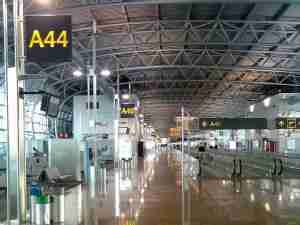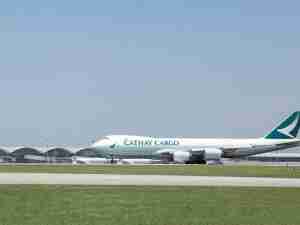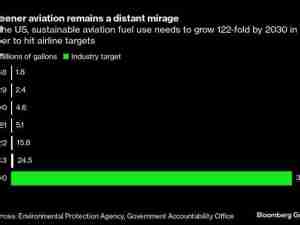Cathay Pacific flags another year of weak cargo demand
By: Reuters | Mar 12 2014 at 03:19 PM | Air Cargo
Cathay Pacific Airways Ltd , one of the world's largest cargo carriers, is buckling up for a year of further weakness in global trade after 2013 ended with higher passenger fares helping to triple profit.
The Hong Kong airline has been competing with the likes of Singapore Airlines Ltd and Korean Air Lines Co Ltd by installing more premium economy seats to help make up for a drop in freight that has persisted since the onset of the euro zone's sovereign debt crisis and hit hard in 2011.
Weak demand for cargo transport was a primary factor behind a steep decline in 2012 net profit to a restated HK$862 million ($111.06 million). From that low base, profit climbed to HK$2.6 billion in 2013, somewhat short of the HK$3.3 billion mean forecast of two analysts polled by Thomson Reuters.
The result benefited from spacious, premium economy seats being installed on 85 medium- and long-haul aircraft, commanding prices an average 80 percent higher than regular economy seats. Yet the underbellies of planes were still in want of cargo.
A tick up in economic growth in some countries in recent years has not been accompanied by a pick up in trade, Chief Executive John Slosar told reporters in Hong Kong after the airline released its earnings results on Wednesday.
"So you see trade figures over the past couple of months quite weak everywhere despite the economies doing better. So there's some talk about less exporting, more local sourcing of things. And obviously that's not good overall," Slosar said.
Inbound China Cargo
Cathay said its outlook for 2014 "looks to be improved", with more long-haul flights such as a fourth daily trip to Los Angeles beginning June and three more weekly flights to Chicago from late August.
Passenger growth on North American routes was pronounced last year, with a passenger yield - or revenue per passenger mile - rising 8.3 percent, compared with an overall passenger yield increase of 1.8 percent.
In total, the airline carried nearly 30 million passengers last year, up 3.3 percent.
A "strengthening of the passenger business" was central to overall revenue rising 1 percent HK$100.5 billion, Cathay said.
Passenger growth from China has long been underpinning earnings among airlines, and Chief Operating Officer Ivan Chu is seeing increased cargo demand there as well.
"In the last two or three years, one of the positive trends is that we are seeing more inbound air cargo into China and Asia. That's a good trend and we expect that trend to continue."
Cargo made up about 24 percent of revenue last year, when Cathay in October opened a HK$5.9 billion cargo terminal in Hong Kong to improve efficiency and reduce costs.
The airline's primary cost is jet fuel, which accounted for 39 percent of the total last year, and which could increase this year because of higher prices, Cathay said.
To cushion the impact, Cathay has replaced some 7470-400 planes from Boeing Co with more fuel-efficient 777s. It will take delivery of 15 more aircraft this year and over 90 more by 2024. (Reuters)










